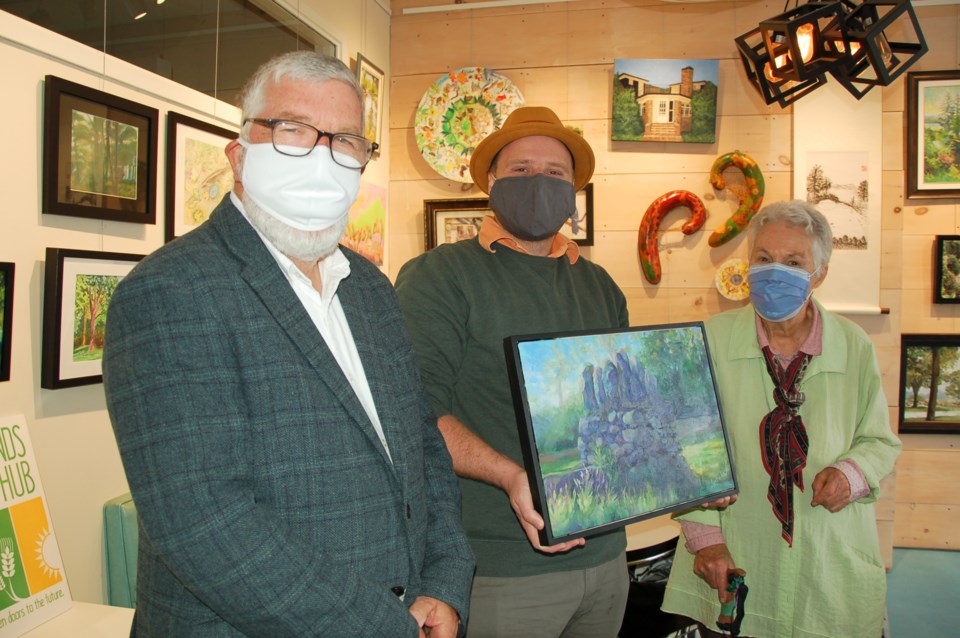Advocacy efforts to preserve heritage features of the former Guelph reformatory lands have captured the attention of the largest conservation organization in the province and garnered an award for Yorklands Green Hub.
This week the Guelph group was announced as this year’s recipient of the A.K. Sculthorpe Award for Advocacy from Architectural Conservancy Ontario (ACO).
“I think it’s very exciting,” David Alton, Yorklands Green Hub’s development manager, said of the award.
“Right now it is a very crucial time when it comes to the future of the Ontario Reformatory and the lands around it,” he added, referring to the ongoing heritage designation process, which is a precursor to sale. “It’s likely there will be transformation coming to those lands soon.”
The former Guelph reformatory property, located on York Road, includes a number of buildings and landscape features currently being considered for designation and protection under two sections of the Ontario Heritage Act – one for individual features and one for the site collectively.
Sometimes referred to as Yorklands, the reformatory property was fully decommissioned in 2001 and has sat largely vacant since 2014. Much of it remains owned by the province.
Yorklands Green Hub is a non-profit organization that envisions the property being “transformed in a mindful way that is respectful of the heritage features,” explained Alton. It’s calling for the creation of an interactive sustainable environment centre with community programming, along with preservation of streams, ponds, meadows and trails.
“For ACO to see … what we have in Guelph, this advocacy capacity and compassion, it’s really great to see. We’re hoping to build that momentum over the coming year,” Alton added.
The A.K. Sculthorpe Award for Advocacy, named in honour of a former ACO president, recognizes an individual, group or non-profit organization that brought greater attention to an important heritage issue or controversy, and/or was able to persuade others, change policies and practices or mobilize people during a heritage crisis.
“We were quite impressed with their commitment and their persistence to the cause,” commented Sarah Hill, chair of ACO’s awards committee. “That award is really about changing hearts and minds, and about perseverance to do that because changing hearts and minds is not an easy feat.”
Award recipients were chosen by a panel of six judges, each with expertise in the field, who worked at arm’s length from ACO in making their selections.
In addition to the Yorklands Green Hub’s various activities and events – including public tours of the site, lectures, art shows and more – the group played a significant role in helping convince city council earlier this year to launch two potential heritage preservation studies for the property instead of just one.
In June, city council unanimously agreed to begin the process of having individual features of the site designated under Part IV of the Ontario Heritage Act, with the site as a whole considered under Part V.
City staff recommended Part V only, but Heritage Guelph urged a combination of the two.
“All the heavy lifting … was done by Heritage Guelph. We and the other groups were simply the public support for their work,” said Alex Smith, vice-chair of Yorklands Green Hub.
Prior to its June decision, council heard from 32 delegates and received nearly 100 pieces of correspondence ahead regarding the staff proposal. Nearly all of them agreed the former reformatory lands hold historical significance and need to be preserved for community enjoyment. All but two of the letters urged council to move forward with both Part IV and Part V designations.
“There was a lot of conversations with councillors. At the start of the campaign, council was very much not on side,” said Alton.
“We had to do a lot of education to the public,” he continued, noting much of that centreed around explaining the difference between the kinds of designation. “We needed to find a way to help people understand what different types of preservation entail so that they could effectively communicate that to each other, to their neighbours and then most importantly, to help council understand that.”
